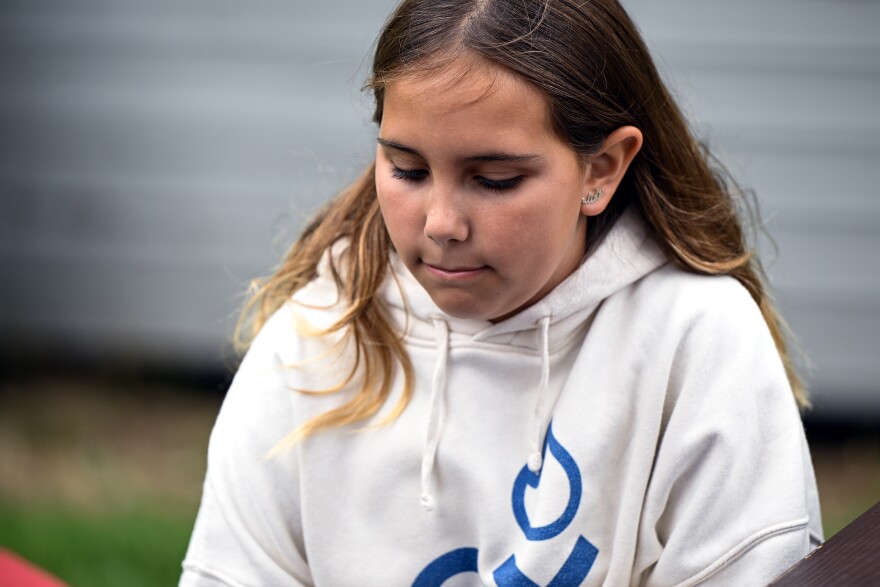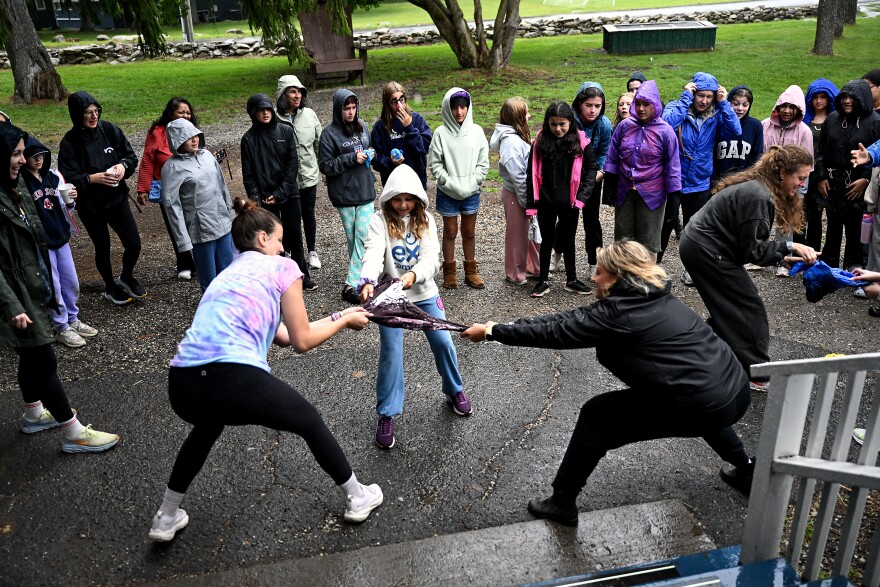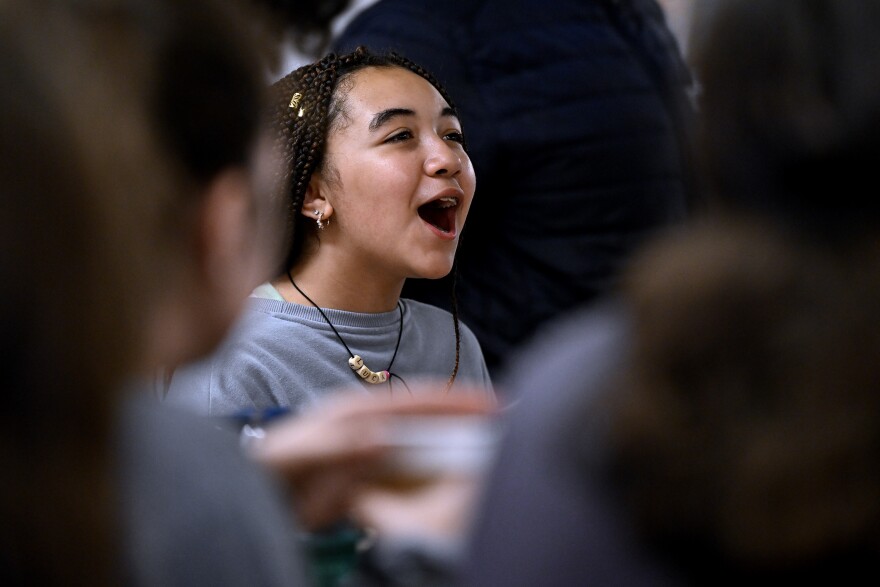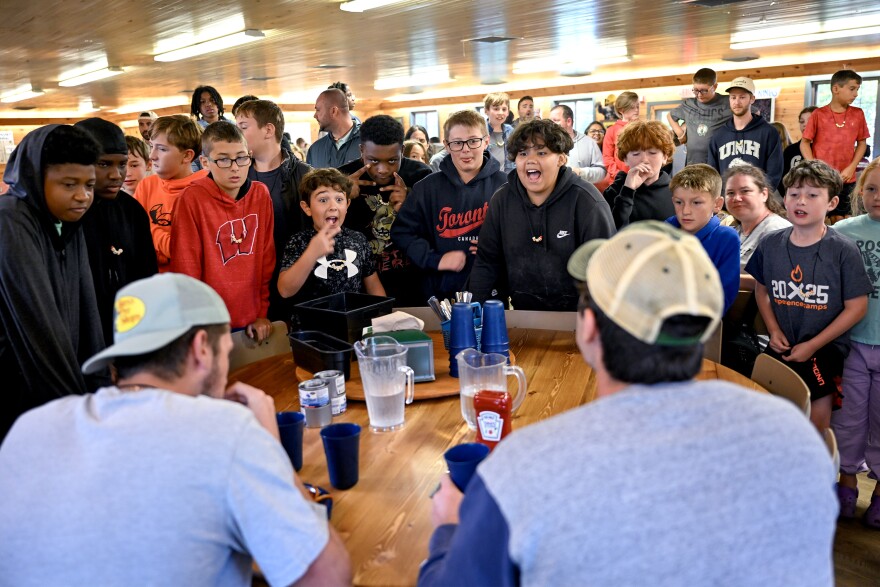Experience Camps, a free, week-long sleepaway camp for kids who’ve experienced the death of a parent or sibling, expanded to Connecticut this summer at a new location in picture-postcard Kent.
Alida Elliott-Bocassi, 11, from Greenwich, Connecticut, is here with her brother Nico. Their mother, Catherine Elliott-Bocassi, died last year from brain cancer and this will be their first Halloween without her, she said, recalling a favorite memory with her mom.
“At Halloween, we’d like to go trick or treating a lot, and we used to get very dressed up, and we would have this spooky dinner where we invite all of our friends over, and we just have a great time together,” she said.

Across the U.S., around 6 million children will experience the death of a parent or sibling by age 18, according to the National Alliance for Children’s Grief.
Elliott-Bocassi is here at camp with other children who have also lost a parent, and she said being part of this group makes her feel not alone in her grief.
“First, we usually share our stories and then we usually just support each other with it,” she said. “If they're crying, we just help them with tissues and hugs.”
A model for peer support
Experience Camps is headquartered in Westport, Connecticut, but the summer program first launched in Maine in 2009 with 27 children.
Since then, it expanded to California, Pennsylvania, Georgia, Michigan and Maryland, reaching more than 1,600 kids. About 80-to-90% of campers return each year, said Sara Deren, founder and CEO of Experience Camps.

“We don't do therapy at camp, but we do have a therapeutic model, so we have a number of clinical staff on site for the week of camp,” she said. “There's one clinician or one licensed therapist that's assigned to each bunk. They're there to support the kids when they are having hard moments, but they're really there to facilitate peer support opportunities.”
“Our model is really one of normalizing grief through the shared experiences of their peers,” she said.
Each person's grief is individual, Deren explained, yet the children see each other in their stories, even when those stories look different to the outside world.
“That's something that's been really special about the connections that are made at camp – where you know a child that has lost three family members to gun violence is connecting with somebody who had, maybe a mother who died of cancer,” Deren said.
‘It changed my life’
These are children, so the camp offers plenty of chances to play.
“Kids' jobs are to play. How they learn about the world, how they learn about themselves and their feelings,” said Ryan Loiselle, clinical director of the boys side of camp in Connecticut. “We’re coloring, we are writing on luminary bags, and then we’re doing silly dance parties. So we’re all belonging.”
During a recent visit to the camp, a drumming instructor taught kids to express their feelings by demonstrating rhythms that the campers drummed out.
As the beats got more complex, the campers were guided to express their emotions.

Lucienne Ghassan, 13, from Brooklyn, New York, said she’s here because her father died in a warehouse fire when she was four.
Ghassan said she tries to push away her feelings when it gets too much. But now, “I think just drumming it out next to other people who are also trying to get through their emotions, it felt really nice to just go fully into it.”
Elsewhere in the camp, Matt Hassiak, 23, and his brother Luke, both volunteer camp counselors, are competing with each other eating hot dogs. The kids take sides, chanting slogans and cheering them on.
Matt and Luke’s dad died when they were both kids. That brought them to Experience Camps, Matt said.
“It really changed my life dramatically,” he said. “Now, I hope to keep coming back and hopefully help others feel comfortable with their grief.”
Grief lasts a lifetime. Learning to live with it can be hard, especially when you’re a kid.
After lunch, when the campers leave for the next activity, one child is sitting at a table, having a difficult moment expressed in angry words.
Lily Reed, 26, said she gets it. She’s a volunteer counselor. Her mom died when she was a child.
Sometimes a kid needs a hug. Sometimes a listening ear. Sometimes space, she said.
“Kids have big feelings as is, so when you add on grief, it just kind of magnifies those feelings,” she explained.

The death of a parent can rob a child of childhood.
Experience Camps seeks to prevent that second loss by giving children a community to lean on. It’s a space to come back to, filled with connection, comfort and the childlike joys of a summer camp.
“When I was going through my own grief, which is still evolving, because it’s a lifetime thing, I had my family and my friends,” Reed said.
“I went to a camp like this, which made me feel normal because you’re around kids who went through the same thing.”








